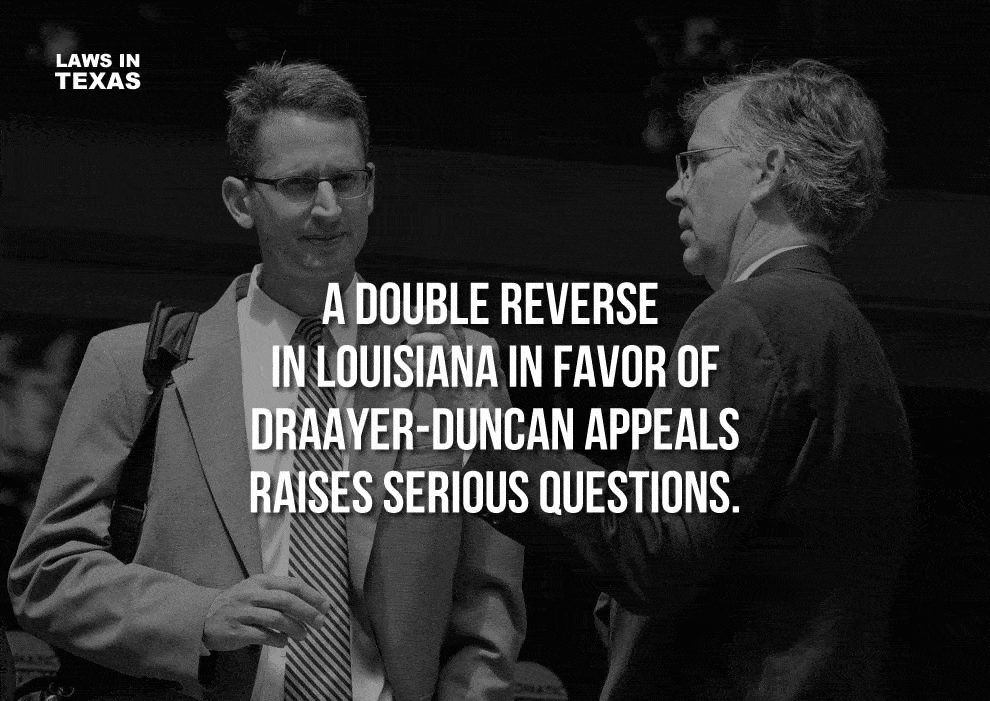Deborah Cross, formerly known as Deborah Cross-Farron
versus
The Bank of New York Mellon, formerly known as Bank of New York,
as Trustee for the Certificate holders of CWALT, Inc., Alternative Loan Trust 2004-30CB;
NewRez, L.L.C., doing business as Shellpoint Mortgage Servicing
APR 8, 2022 | REPUBLISHED BY LIT: APR 9, 2022
Before King, Jones, and Duncan, Circuit Judges. [King was on the prior appeal panel as well, as shown in the article above]
Deborah Cross executed a mortgage note and deed of trust that granted the note holder a lien against her residential property.
Cross has not paid her mortgage or property taxes since December 2014.
The Bank of New York Mellon Corporation (“BONYM”) holds the note and originally accelerated its maturity date on February 11, 2016.
BONYM attempted to schedule foreclosure sales in June 2018 and September 2019, both within the four-year limitations period provided by Tex. Civ. Prac. & Rem. Code
§ 16.035.
But it was thwarted by temporary restraining orders (“TROs”) entered by Texas state courts.1
On February 14, 2020, NewRez LLC d/b/a Shellpoint Mortgage Servicing (“Shellpoint”), which services Cross’s mortgage, sent a letter that requested payment of less than the accelerated amount and reflected the loan’s original maturity date.
Cross brought this action against BONYM and Shellpoint (“Defendants”) to quiet title to the property in her name and to obtain a declaration that the statute of limitations to foreclose had lapsed.
BONYM counterclaimed, inter alia, for breach of contract and “a judgment allowing it to foreclose its lien on the property in accordance with the deed of trust and Texas property code section 51.002, or alternatively, a judgment for judicial foreclosure.”
Defendants and Cross eventually moved for summary
judgment on Cross’s claims and BONYM’s counterclaims.2
The district court denied Cross’s motion and granted Defendants’ motion on Cross’s claims before also granting BONYM’s motion on its breach of contract and non-judicial foreclosure counterclaims and entering final judgment in favor of BONYM.
Cross timely appealed.
This court reviews applications of state substantive law and grants of summary judgment de novo.
Renfroe v. Parker, 974 F.3d 594, 599 (5th Cir. 2020) (citations omitted).
Federal Rule of Civil Procedure 56(a) requires courts to enter summary judgment when a movant establishes that “there is no genuine dispute as to any material fact and [it] is entitled to judgment as a matter of law.”
The district court correctly determined that the TROs tolled the limitations period 30 days,
extending the four-year deadline to foreclose from February 11, 2020, to March 12, 2020.
“[L]enders have a substantive right to elect judicial or nonjudicial foreclosure in the event of a default,” and the time during which a lender “is prevented from exercising [its] legal remedy by the pendency of legal proceedings . . . should not be counted against [it] in determining whether limitations have barred [its] right.”3
Douglas v. NCNB
Tex. Nat’l Bank, 979 F.2d 1128, 1130 (5th Cir. 1993);
Jackson v. Johnson, 950 F.2d 263, 265 (5th Cir. 1992) (collecting cases).
The TROs restrained BONYM from pursuing its preferred foreclosure remedy for 30 days and therefore tolled the limitations period for non-judicial and judicial foreclosure until March 12, 2020.
The district court also correctly found that “Shellpoint effectively decelerated [Cross’s] loan on February 14, 2020, thus resetting the clock on limitations before they ran on March 12, 2020.”
In Texas, “a lender may unilaterally abandon acceleration of a note,” thereby restoring the original maturity date and resetting the running of limitations, “by sending notice to the borrower that the lender is no longer seeking to collect the full balance of the loan and will permit the borrower to cure its default by providing sufficient payment to bring the note current under its original terms.”
Boren v. U.S. Nat’l Bank Ass’n, 807 F.3d 99, 105 (5th Cir. 2015).
Cross “received unequivocal notice of Shellpoint’s intent to decelerate on February 14, 2020,” when it sent the letter seeking to collect less than the full balance of her loan and restoring the original maturity date.
The letter sufficiently evidenced abandonment of the prior acceleration and reset the limitations period.
Because BONYM can legally enforce the note and the deed of trust, it “is entitled as a matter of law to a judgment allowing it to [non-judicially] foreclose its lien on the Property in accordance with the Deed of Trust and Texas Property Code § 51.002.”
BONYM also “satisfied all the elements of
a breach of contract claim[]” because Cross “does not dispute that BONYM performed its obligations under the Note, nor does she dispute that she breached by failing to pay the required monthly installments[]” or that “her breach damaged BONYM . . . .”
For these reasons, the district court correctly granted BONYM’s motion for summary judgment on its breach of contract and non-judicial foreclosure counterclaims, granted Defendants’ motion for summary judgment rejecting Cross’s claims, and denied Cross’s summary judgment motion.
The judgment of the district court is AFFIRMED.















